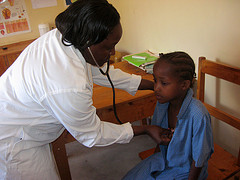Finding Medical Care On the Road and In a Hurry
22 January 2012
It’s been estimated that around 20 percent of all travelers get sick each year, and out of that 20 percent, over 5 percent require emergency care while traveling abroad. As a result, the Centers for Disease Control and Prevention (CDC) recommends that travelers have a plan for how they will obtain medical help should they need it while traveling. While this is important for families traveling with children, it’s also important for solo travelers and even business travelers.
In addition to the possibility of not understanding the local language or having a pre-existing medical condition, let’s go over the common medical risks travelers face:
- The quality of drugs and other pharmaceuticals in other countries may not meet U.S. standards or they may go by different names. Travelers should bring with them all the drugs and medicines they will need, including pain relievers, anti-diarrhea drugs, and even anti-malaria drugs (if appropriate). Travelers who require injections should bring their own supplies.
- The safety of blood products in many countries cannot be guaranteed. Not all countries have accurate systems for screening blood for infectious agents, therefore risking the transmission of disease through blood. Travelers in developing countries should receive a blood transfusion only in a life-or-death situation and they should make every effort to ascertain whether the blood they are receiving is safe from transmissible diseases including HIV.
Even if a traveler does everything they can to prevent illnesses and injuries on their trip, stuff happens.
So, how does a traveler reliably find a qualified medical doctor on the road and in a hurry?
There are two highly recommended ways and highly reliable ways for travelers to be prepared to find qualified medical care while traveling:
- Have travel insurance and call your travel assistance services number
- Become a member of IAMAT, or International Association for Medical Assistance to Travelers
Ideally, having both is the best and here’s why:
- The right travel insurance plan will pay for your medical treatment, emergency transportation, and medical evacuation. Their travel assistance services will help a traveler find a local hospital or other medical provider in an emergency. Many travel insurance plans also make arrangements and pay for a bedside visit for a hospitalized traveler and relay messages to family, friends, and business partners in travel medical emergency.
- IAMAT members have online access to qualified and affiliated doctors and clinics in more than 90 countries and participating health professionals are fluent in English. They also have access to updated pre-travel information by selecting their travel destination and reviewing the related travel health information.
Why both Travel Insurance and IAMAT Membership?
Having a travel insurance plan and membership in IAMAT is ideal because:
- While IAMAT members will pay a fixed rate (about $100-$150) for the first consultation, travel insurance will reimburse the traveler for that amount. Plus, if the traveler is admitted to the hospital, the traveler’s travel medical coverage will pay for those charges up to the covered limit of the plan.
- Both travel insurance assistance services and IAMAT can help a traveler find a local medical care provider. Travel insurance can help with translations, if necessary, but IAMAT refers travelers to pre-qualified English-speaking providers. Either way, having both on your side couldn’t be a bad thing in an emergency.
- IAMAT provides a pamphlet for a traveler’s doctor to fill out with their medical history prior to departure. Some travel insurance plans have a service where travelers can load their medical history into an online service where it will be accessible via the Internet. The IAMAT member carries their medical history with them in printed format, which has its benefits.
- Travel insurance will pay (up to the plan limits) for the costs of local transportation and emergency medical evacuation. IAMAT doesn’t.
- IAMAT members have access to respected travel medicine sources and can research the risks for their destination before they leave. Some travel insurance providers include pre-trip health planning with their assistance services, but again, having both can’t be a bad thing.
Membership in IAMAT is free for one year and renewable with a tax-deductible donation. Travel insurance, of course, will cost you some cash.
Damian Tysdal is the founder of CoverTrip, and is a licensed agent for travel insurance (MA 1883287). He believes travel insurance should be easier to understand, and started the first travel insurance blog in 2006.

